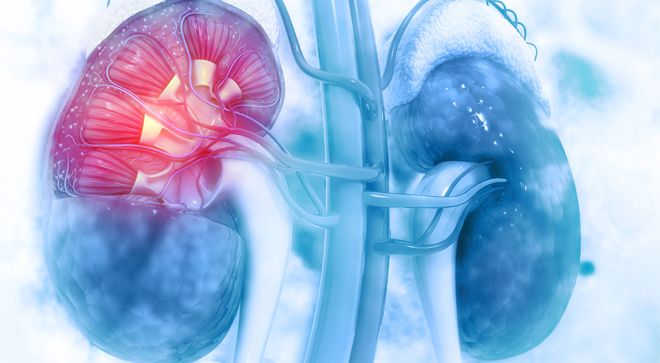Corticosteroids During Opdivo May Not Lower Survival in Kidney Cancer
Patients with metastatic clear cell renal cell carcinoma who received corticosteroids during Opdivo treatment did not experience a negative impact on survival.
Opdivo is a common treatment for patients with kidney cancer, though the drug can come with immune-related side effects.

The use of corticosteroids during treatment with Opdivo (nivolumab) did not shorten survival compared with those who did not receive the drug to address side effects in patients with metastatic clear cell renal cell carcinoma, a type of kidney cancer.
Results from this study were published in the journal JAMA Oncology.
Patients with metastatic clear cell renal cell carcinoma are often treated with the immune checkpoint inhibitor Opdivo, which is considered standard of care for this disease. Any side effects related to this treatment are typically treated with corticosteroids, which are potent drugs that suppress the immune system. However, there is growing concern around the use of corticosteroids and their potential effect on the efficacy of immune checkpoint inhibitors and patient survival.
READ MORE:Immunotherapy Side Effects: ‘No Organ System Potentially Unaffected’
Researchers aimed to evaluate the potential link between corticosteroids and survival outcomes during treatment with Opdivo in patients with metastatic clear cell renal cell carcinoma. To do so, they assessed data from 665 patients (mean age, 63.4 years; 22.7% women) with metastatic clear cell renal cell carcinoma who progressed while receiving antiangiogenic treatment.
There were several outcomes of interest for this study including overall survival (the time from treatment when a patient with cancer is still alive) and progression-free survival (the time during and after treatment when a patient with cancer is alive without disease worsening). Follow-up was conducted for a median of 23.9 months.
During follow-up, 113 patients (17%) received corticosteroids while undergoing treatment with Opdivo. The median time between starting treatment with Opdivo and corticosteroid use was 21.6 weeks.
The majority of patients in this study — 83 patients (73.5%) received corticosteroids to address immune checkpoint inhibitor-related side effects. Of note, 47 patients (41.6%) had side effects that were considered severe or worse.
The other reasons for corticosteroid use in patients with metastatic clear cell renal cell carcinoma included infections (17 patients; 15%), side effects related to radiotherapy (3 patients; 2.7%) and chronic obstructive pulmonary disease (2 patients; 1.8%).
Researchers performed an analysis of the data at 12 weeks, which determined that overall survival rates at 12 months for patients exposed to corticosteroids was 85.6% compared with 73.5% for those who did not receive the medication. Rates of progression-free survival at 12 months were 61.1% for the corticosteroid group versus 41.6% in the non-corticosteroid group.
“We found that patients receiving corticosteroids had a longer (progression-free survival) and (overall survival) than patients who did not,” the researchers wrote.
At a similar analysis performed at 24 weeks, researchers found similar results regarding overall survival and no difference for progression-free survival.
For more news on cancer updates, research and education, don’t forget to subscribe to CURE®’s newsletters here.
FDA Approves 3 Treatments, Cancer Vaccine Shows Promise
December 20th 2023The Food and Drug Administration recently approved treatment for some patients with neuroblastoma, kidney cancer and bladder cancer. Elsewhere, a cancer vaccine made headlines for the treatment of patients with melanoma.
Listen